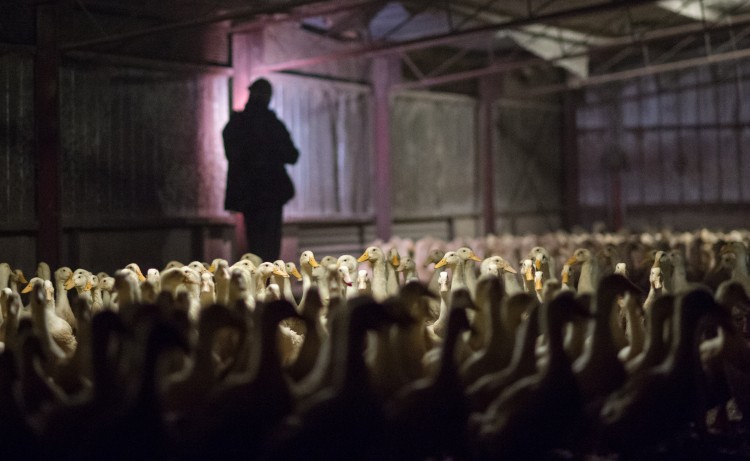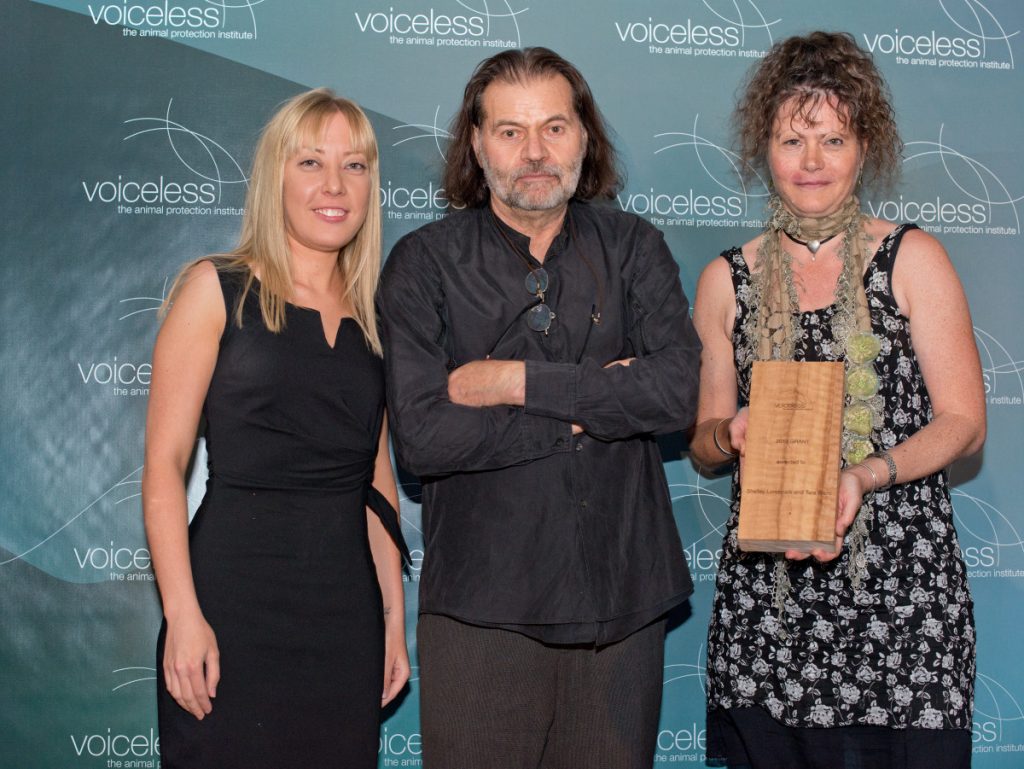Established in 2014 with the assistance of a Voiceless grant, Australia’s Animal Defenders Office (ADO) is a national community legal centre devoted to legal matters affecting animals and their defenders. With jurisdictions across Australia currently seeking to introduce laws addressing the actions of animal activists, Voiceless invited ADO Co-Founder Tara Ward to discuss the growing trend of ‘ag-gag laws’ and their impacts on free speech and animal protection.
AG-GAG LAWS
‘Ag-gag laws’ come in many different forms. Some ag-gag laws make it a crime to take footage of animal agricultural operations while on site without consent, and/or criminalise the possession, distribution or publication of such footage. Whilst others criminalise failure to provide such footage to authorities within a short period of time (e.g. within one day).
Regardless of their form, the effect of ag-gag laws is to silence members of the community who wish to raise awareness about how animals are used in various industries.
BORN IN THE USA
Ag-gag laws originated in the USA in the early 1990s when factory-farm and slaughterhouse operations were becoming more and more hidden from public scrutiny. In response, animal activists turned to undercover investigations to reveal routine animal abuse in these establishments. As social media emerged, footage from the undercover investigations was distributed via social media platforms, thereby reaching an extremely wide audience. Animal industries and governments created ag-gag laws to try to stop the investigations and exposés. In America, many ag-gag laws have been defeated on freedom-of-speech grounds.
THE DANGERS OF AG-GAG
There are many problematic aspects of ag-gag laws. They don’t tackle the real issues, such as legalised cruelty to animals in factory farming and slaughterhouses, and extremely low penalties for animal cruelty and neglect in animal welfare laws. Instead of punishing those responsible for animal suffering, they punish the whistle-blowers or ‘messengers’. They stifle rather than encourage industry transparency and visibility, and make it more difficult to obtain evidence of sustained animal abuse carried out in animal enterprises over a period of time. They don’t protect the public interest in knowing how food animals are treated, and they stifle freedom of speech and assembly and the right to protest. In doing so, they prioritise industry profits above both animal welfare and the public interest in enforcing anti-cruelty laws.

Image: Jo-Anne Macarthur/We Animals
AG-GAG IN AUSTRALIA
Several ag-gag laws have been proposed, and in some cases passed, in Australia. Until recently, governments and enforcement authorities were content to rely on existing generic laws to target animal activists, such as surveillance devices laws. These laws make it an offence to install, use, or maintain a surveillance device (such as a camera) in certain circumstances, or to publish or communicate matters obtained by the illegal use of surveillance devices. In 2017, two animal activists were prosecuted for alleged breaches of the Surveillance Devices Act 2007 (NSW) in relation to intensive piggeries. The charges were dismissed by the Local Court.
PROPOSED COMMONWEALTH LAW
More recently, several jurisdictions have proposed or passed new laws specifically targeting animal activists. These include the Criminal Code Amendment (Agricultural Protection) Bill 2019 proposed by the Australian Government in early July 2019. The Bill would create two new offences in relation to the incitement of trespass or property offences on agricultural land. Submissions about this Bill closed this week.
NEW ON-THE-SPOT FINES IN QUEENSLAND
In Queensland, on-the-spot fines came into effect in April 2019 under biosecurity laws for anyone illegally entering a farm or animal processing business. In May 2019, a member of the Queensland Opposition introduced a Bill that creates three new trespass offences of aggravated trespass, serious criminal trespass, and organised trespass. The Bill was introduced as a direct response to what the Opposition referred to as a ‘wave of invasions conducted by animal extremists directed at farmers and those within the agricultural supply chain’.
BIOSECURITY CONCERNS?
More insidious is the use of biosecurity as an issue to vilify and target animal activists. This occurs when governments and animal industries claim animal activists are biosecurity threats because they are likely to cause biosecurity incidents (e.g. spread diseases) on farms. This is despite there being no evidence linking animal activists with any biosecurity incidents on farms. Nonetheless, in July 2019, the NSW Government announced it will introduce harsh new penalties under biosecurity laws for ‘those who illegally trespass on farms, creating biosecurity risks’.

Image: Jo-Anne Macarthur/We Animals
INQUIRY UNDERWAY IN VICTORIA
On 1 May 2019, the Victorian Parliament established an inquiry into ‘the effectiveness of legislation and other measures to prevent and deter activities by unauthorised persons on agricultural and associated industries’. The ADO is considering raising a number of concerns about the Inquiry, including:
- whether existing criminal offences already cover the ‘unauthorised activities’ that are the focus of the Inquiry;
- whether there is any evidence that activists are biosecurity threats, and if there is, how does it compare to the biosecurity risk posed by workers or wildlife or other non-activist sources;
- whether there is any evidence of activists not complying with prevention of cruelty to animals legislation; and if there is, how does any suffering allegedly caused by activists compare to the widespread distress, pain, fear and suffering caused by factory-farming and other aspects of animal farming on a regular basis; and
- if animal welfare outcomes are a concern, why doesn’t the Inquiry consider some of the worst examples of harmful agricultural practices, such as battery hen cages, pig sow stalls and farrowing crates, intensive housing of ducks, killing pigs in gas chambers, cattle feedlots, the slaughter of bobby calves, and the maceration of male chicks (to name a few).
WANT TO HAVE YOUR SAY?
Submissions are currently open for the Inquiry into the Impact of Animal Rights Activism on Victorian Agriculture - closing 2 August 2019. Lodge your submission here.

Voiceless Blog Terms and Conditions: The opinions expressed on the Voiceless Blog are those of the relevant contributors and may not necessarily represent the views of Voiceless. Reliance upon any content, opinion, representation or statement contained in the article is at the sole risk of the reader. Voiceless Blog articles are protected by copyright and no part should be reproduced in any form without the prior consent of Voiceless.
LIKE THIS POST? RECEIVE UPDATES FROM VOICELESS STRAIGHT TO YOUR INBOX BY SIGNING UP TO OUR NEWSLETTER HERE.
Disclaimer: The views and opinions expressed in this interview are those of the interviewee and do not necessarily reflect the position of Voiceless or its members.


